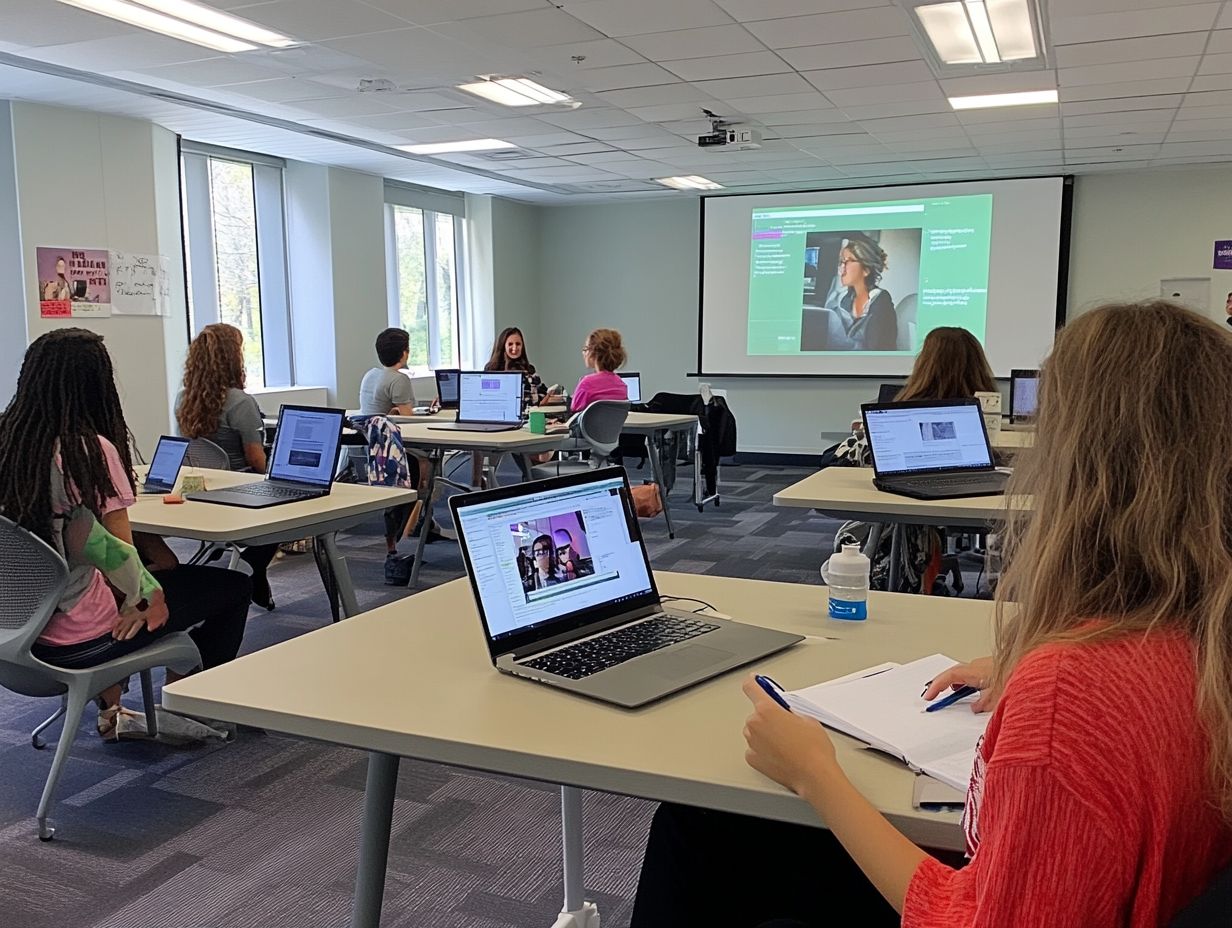Online Master’s in Journalism: What to Expect
Pursuing an online master s in journalism provides you with a flexible pathway to enhance your skills and elevate your career in this dynamic field.
This overview highlights the key distinctions between online and traditional formats, allowing you to make an informed choice.
It delves into the curriculum, exploring core and elective courses, along with various specializations available to enrich your academic journey.
It also addresses admission requirements, financial considerations, and the unique online learning experience, ultimately equipping you to navigate the myriad career opportunities in journalism.
Contents
- Key Takeaways:
- Overview of Online Master’s in Journalism Programs
- Curriculum and Coursework
- Admission Requirements
- Cost and Financial Aid
- Online Learning Experience
- Career Opportunities with an Online Master’s in Journalism
- Frequently Asked Questions
- What is an online Master’s in Journalism program?
- What are the benefits of pursuing an online Master’s in Journalism?
- What are the admission requirements for an online Master’s in Journalism program?
- How long does it take to complete an online Master’s in Journalism program?
- What courses can I expect to take in an online Master’s in Journalism program?
- Can I pursue a concentration or specialization in an online Master’s in Journalism program?
Key Takeaways:

Online Master’s in Journalism programs offer flexibility and convenience, making them a popular choice for working professionals looking to advance their careers. The curriculum typically includes a mix of core and elective courses, with opportunities for specialization in areas such as investigative journalism and multimedia reporting. Admission requirements often include a bachelor’s degree, relevant work experience, and strong writing and communication skills.
Overview of Online Master’s in Journalism Programs
An online master’s program in journalism presents a comprehensive and flexible educational path for aspiring professionals like you. If you’re considering furthering your education in the field, you might also want to explore an online master’s in social work, which enables you to acquire advanced knowledge and skills essential for advancing your career in the ever-evolving media landscape.
These programs meet quality standards and are recognized by education authorities, offering various concentrations such as digital journalism, global journalism, and investigative reporting equipping you with vital tools to navigate media law, practice ethical reporting, and master cutting-edge storytelling techniques, all while fitting seamlessly into your schedule through virtual learning environments.
Differences between Online and Traditional Programs
The differences between online and traditional journalism programs primarily hinge on flexibility and accessibility. With online journalism programs, you have the freedom to learn at your own pace, balancing your studies with work and personal commitments.
In contrast, traditional programs offer a structured environment, emphasizing face-to-face interactions that are invaluable for honing your communication skills. These programs often include hands-on experiences through workshops and provide immediate feedback from instructors, enriching your educational journey.
The online format connects you with a diverse network of students from various locations, fostering rich discussions and a broader exchange of ideas and perspectives. While you may not experience in-person camaraderie, both formats ensure faculty engagement. However, the online setting may limit spontaneous discussions that naturally arise in a traditional classroom.
Curriculum and Coursework
The curriculum for a master’s in journalism is designed to be comprehensive and dynamic. It includes core journalism courses alongside a range of elective options and specialized offerings tailored to the evolving landscape of contemporary media.
You ll explore multimedia storytelling and ethical reporting techniques, ensuring you graduate with essential skills needed to excel in today s fast-paced journalism environment.
Core and Elective Courses
Core courses lay the groundwork for essential journalism skills, covering news writing, media law, and ethical reporting.
Elective courses allow you to explore specialized topics such as digital journalism and community journalism.
These foundational subjects arm you with the vital tools needed to navigate the intricate media landscape of today. For example, understanding media law not only helps you avoid legal pitfalls but also deepens your understanding of the ethical dimensions of reporting.
Elective courses like investigative journalism or multimedia storytelling enable you to refine your focus on specific areas that resonate with your career aspirations.
As communication technology evolves, courses addressing social media strategies, podcast production, and data journalism will significantly bolster your adaptability, ensuring you re well-equipped to meet the industry s ever-changing demands.
Specializations and Concentrations
Specializations within online master’s programs in journalism allow you to tailor your education to align with your career aspirations and interests.
You’ll find concentrations in areas such as:
- Digital journalism
- Global journalism
- Investigative reporting
- Arts and culture
- Business and economics
By selecting a specific concentration, you gain the in-depth knowledge and skills essential for thriving in today s fast-paced media landscape.
If you focus on digital journalism, you ll learn to harness emerging technologies and multimedia platforms, preparing you for roles in a news environment that prioritizes online platforms.
If you re drawn to global journalism, you’ll gain a nuanced understanding of diverse cultures and global issues, positioning you to cover international stories with confidence and insight.
Ultimately, these specialized programs are essential for your success in the industry! They cater to various media needs and empower you to be adaptable and responsive to the ever-evolving trends within the field.
Admission Requirements

Admission to online master’s programs in journalism typically entails a few key requirements. You’ll need to submit a completed application form, along with writing samples that showcase your skills.
Relevant academic qualifications are also necessary, though they can vary by institution. These requirements ensure that candidates are well-prepared for the rigors of advanced journalism education.
Application Process and Materials
The application process for online master’s in journalism programs generally requires you to submit various materials, including writing samples, letters of recommendation, and a personal statement outlining your goals and experiences in journalism. Each of these components is essential in creating a comprehensive picture of your suitability for the program.
Your writing samples showcase your ability to communicate effectively and highlight your unique voice. Letters of recommendation provide valuable third-party validation of your skills and character.
The personal statement is particularly significant; it s your chance to express your passion for journalism, outline your professional aspirations, and share how your background has shaped your interest in the field. Together, these elements significantly enhance the strength and overall impact of your application.
Prerequisites and Qualifications
Most online master s programs in journalism require you to hold a bachelor s degree in journalism or a related field, coupled with relevant experience or coursework. This ensures you have a solid foundation in the principles and practices of journalism.
These prerequisites are designed to confirm your understanding of essential concepts like news writing, reporting ethics, and media law. Many programs also seek evidence of your research or communication skills, which can be showcased through internships, professional roles, or a portfolio of published work.
Meeting these criteria not only enhances your readiness but also fosters an environment where you can dive deeper into advanced topics, equipping you with the skills necessary to thrive in a rapidly evolving media landscape.
Cost and Financial Aid
The cost of an online master’s degree in journalism varies widely based on the institution, program format, and location.
Therefore, it s important to thoroughly investigate tuition rates, explore financial aid options, and consider potential scholarships or grants to alleviate the financial burden of your education.
Start your journey today and take the first step toward your dream career in journalism!
Tuition and Fees
Tuition rates for online master’s programs in journalism can vary significantly, influenced by factors such as the institution’s reputation, location, and course delivery methods.
For you, this range in pricing means that careful consideration is crucial when evaluating your options. Some programs may feature lower tuition rates but lack robust networking opportunities or industry connections.
Conversely, others may command higher fees, justifying them with comprehensive curricula and esteemed faculty. It’s essential to look beyond just tuition and factor in additional fees, such as technology and materials charges.
By crafting a detailed budget that includes living expenses alongside tuition, you can gain a clearer understanding of your financial commitment. Conducting meticulous research on costs can help you avoid unexpected financial strains, ensuring that you select a program that aligns perfectly with both your educational aspirations and budgetary realities.
Scholarship and Grant Opportunities
Exciting scholarships and grants are available now don t miss your chance! These funding options reduce financial strain and allow you to focus on sharpening your skills and knowledge in a competitive field.
Many institutions extend merit-based scholarships that recognize academic excellence, while others offer need-based grants tailored for students facing financial challenges. You may also discover specialized opportunities aimed at underrepresented groups within journalism, promoting diversity in the profession.
The application processes can vary, often requiring personal statements, letters of recommendation, and transcripts, which underscores the importance of crafting a compelling narrative. These financial aids are your ticket to pursuing your dreams and making meaningful contributions to the ever-evolving landscape of news media.
Online Learning Experience

The online learning experience for master’s in journalism students immerses you in a dynamic virtual classroom environment. Here, you engage with a variety of course delivery methods, including video lectures, interactive discussions, and collaborative assignments.
Each element is thoughtfully designed to cultivate a strong sense of community and interaction among faculty and peers, enhancing your educational journey.
Virtual Classroom and Course Delivery
In a virtual classroom setting, you ll find that online master’s students in journalism enjoy a rich tapestry of course delivery methods, including multimedia resources, live lectures, and course materials that can be accessed anytime all tailored to suit various learning preferences and schedules.
These diverse approaches make your learning experience not only more accessible but also engaging. You ll typically interact through platforms like Zoom and Blackboard for real-time discussions, while tools like Google Drive enhance collaborative projects effortlessly.
The incorporation of video lectures, podcasts, and infographics introduces dynamic content that resonates with different learning styles, deepening your understanding of journalistic principles.
Discussion boards and forums further encourage peer interaction, fostering a vital sense of community in the online environment. Ultimately, this harmonious blend of technologies and resources enriches your educational experience, allowing you to stay connected and actively engaged in your studies.
Interactions with Faculty and Peers
Interactions with faculty and peers in online master’s programs are seamlessly facilitated through a variety of channels, such as discussion boards, live Q&A sessions, and collaborative projects. These avenues promote valuable networking and mentorship opportunities essential for your personal and professional growth.
These interactions are significant because they offer more than just knowledge acquisition. They help foster a sense of community among students pursuing journalism.
Thoughtful discussions with instructors provide valuable insights that enrich your critical thinking skills. Engaging with peers encourages collaboration and exposes you to diverse perspectives that significantly enhance your learning experience.
In an online environment, where feelings of isolation can be more pronounced, the relationships built through these interactions become crucial. They empower you to thrive academically while cultivating strong professional networks that will undoubtedly benefit you in your future career.
Career Opportunities with an Online Master’s in Journalism
Earning an online master’s degree in journalism unlocks a world of exciting career possibilities across diverse sectors. Whether you re drawn to traditional media, digital platforms, or public relations, this degree equips you for success.
- Investigative Reporting
- Media Relations
- Community Journalism
- Content Creation
Job growth is projected in these exciting fields, making it a strategic choice for your future.
Job Prospects and Salary Potential
Graduates of online master’s programs in journalism can look forward to promising job prospects and competitive salary potential, especially in specialized areas like digital journalism. The demand for skilled journalists is rising fast, thanks to the ever-evolving media landscape.
Fields such as investigative journalism and data journalism are flourishing, presenting ample opportunities for those equipped with the right skill set. Salaries in these roles can vary significantly, usually ranging from $40,000 to over $80,000, depending on experience, location, and specific niche.
Your earning potential is influenced by your employer’s size and prestige, as well as your ability to harness innovative technologies and compelling storytelling techniques. Specialized training in areas like multimedia storytelling, which involves telling stories using images, videos, and text, is increasingly vital for securing desirable positions in this competitive arena.
Frequently Asked Questions
What is an online Master’s in Journalism program?

An online Master’s in Journalism program is a graduate-level degree that focuses on advanced concepts and skills in journalism, including multimedia storytelling, news writing, journalism ethics, and media law. This program is typically completed online, allowing students to access course materials and lectures remotely at their convenience.
What are the benefits of pursuing an online Master’s in Journalism?
There are many benefits to pursuing an online Master’s in Journalism, including flexibility, convenience, and the ability to continue working while earning your degree. Online programs often have lower tuition costs compared to on-campus programs, allowing students to save money while still receiving a high-quality education.
What are the admission requirements for an online Master’s in Journalism program?
Admission requirements for online Master’s in Journalism programs may vary by institution, but typically include a bachelor’s degree from an accredited university, letters of recommendation, a personal statement, and writing samples. Some programs may also require a certain GPA or GRE scores.
How long does it take to complete an online Master’s in Journalism program?
The length of an online Master’s in Journalism program can vary depending on the institution and the student’s pace. On average, full-time students can complete the program in 1-2 years, while part-time students may take 2-3 years. Some programs may offer accelerated options that allow students to graduate sooner.
Start your journey in journalism today!
What courses can I expect to take in an online Master’s in Journalism program?
In an online Master’s in Journalism program, you will explore many exciting topics. Courses often include journalism ethics, media laws, investigative reporting, multimedia storytelling, and news writing.
You can also focus on special areas like broadcast journalism, digital media, or international reporting. This variety allows you to tailor your education to your career goals.
Can I pursue a concentration or specialization in an online Master’s in Journalism program?
Absolutely! Many programs offer specializations to help you dive deeper into your interests. Common options include broadcast journalism, digital media, and using data to tell news stories.
Choosing a concentration helps you align your studies with your passion and career aspirations.






